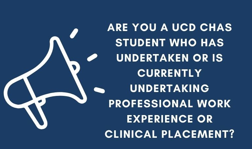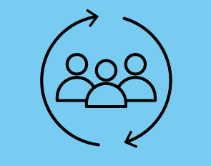Understanding Gender and Diversity Challenges in Student Professional Work Experience & Clinical Placements

How do I take part?
Our first cafe took place on Wednesday 24th September. Watch this space for updates on further sessions.
What’s the project about?
The UCD College of Health and Agricultural Sciences invites you to participate in a series of interactive discussions aimed at understanding and addressing broad EDI (Equality, Diversity and Inclusion) challenges faced by students during professional work experience and clinical placements. These challenges may be related to gender, civil status, family status, sexual orientation, religion, age, age, disability, race or membership to the Traveller community.
Why should I take part?
Your insights will help shape a more inclusive and equitable learning environment for all College of Health and Agricultural Sciences (CHAS) students.

Who is running the project?
This research project is being led by the College of Health and Agricultural Sciences at UCD. Our contact details are included at the end of this document.
What are the objectives of this study?
The purpose of the study is to:
-
Identify gender, race, disability and broader EDI challenges students face during placements.
-
Evaluate the effectiveness of existing UCD supports and policies.
-
Develop actionable solutions to improve the placement experience for all students.
Why have I been invited to take part?
We’re inviting you to share your experience as a UCD CHAS student involved in professional work experience and clinical placements.

What will happen if I volunteer?
Your participation is entirely voluntary. If you agree to participate, you will be invited to take part in a series of World Cafés. The World Café is a structured, interactive format where small groups discuss key questions related to gender, race, disability and broader EDI challenges. The World Cafés will focus on a different aspect of the placement experience, including:
- Identifying Challenges: Share your experiences and challenges related to gender, race, disability, or other EDI issues during placements. Discuss how workplace culture and power dynamics influence these challenges.
- Exploring UCD Supports: Reflect on your awareness and use of UCD’s EDI policies and support services. Identify gaps in current support systems and suggest improvements.
- Solutions and Action Plan: Brainstorm practical strategies to create a more inclusive placement experience.
Group discussions will be led by facilitators, and the facilitators will record this data in the format of flip charts/notes and audio recordings. You will not be asked about specific students or staff and we would ask that in the course of your participation you do not name any individual or provide any details on third parties that may be identifiable.
What will happen to my information?

All discussions will be anonymized, and no identifying information will be shared in reports or publications. Participation or no-participation in this study will not affect your grade evaluations.
Your views will be combined with those of others and used to develop an understanding of gender and broader diversity challenges faced by CHAS students during professional work experience and clinical placements. This will inform UCD’s EDI strategy and Athena SWAN initiatives, allow us to develop training programs and policy recommendations, and potentially publish findings in academic journals or present them at conferences (all data will be anonymized).
What if I feel overwhelmed?
If discussing sensitive topics causes distress, support services are available:
- UCD counselling
- Dignity & Respect services
- Student advisors
What are the benefits or risks associated with the study?
Your input will directly inform UCD’s policies and support systems. As such, the findings from this study will be presented at university level and at national and international conferences. The findings will also be submitted for publication in peer-reviewed journals. However, no individual participant will be identified in any publication or presentation and only anonymised quotes will be used in these reports and publications. There are no anticipated risks associated with participating in this study. However, discussing personal experiences related to gender and diversity challenges may bring up sensitive topics. Support services will be available if you feel uncomfortable or distressed during or after the discussions.
What if I change my mind?
Your involvement is entirely voluntary, and you can withdraw at any time up to the point of anonymization of recorded discussions/data. However, it is not possible to withdraw after data has been anonymized.
NEXT STEPS:
If you are willing to take part in the study, we would ask you to please complete the (opens in a new window)short google form.
Who do I contact if I have any questions?
If you have any further questions about the research or would like information on the findings, you can contact: chas@ucd.ie; Deirdre O’Connor (deirdre.oconnor@ucd.ie); Eoin Brennan (eoin.brennan@ucd.ie).
Confidenitality:
While all data will be anonymized in publications or reports, participants should be aware that by choosing to share personal experiences in a group setting, their anonymity cannot be guaranteed among fellow participants. Please consider this before contributing identifiable details. All participants will be asked to treat the discussions as confidential and respect the privacy of others. We ask that you do not repeat or share what others have said outside of the session. If discussing sensitive topics causes distress, support services (e.g., UCD counselling, dignity & respect services, student advisors) will be available. Participation or no-participation in this study will not affect your grade evaluations.
UCD Ethics Reference: LS-25-34-Brennan